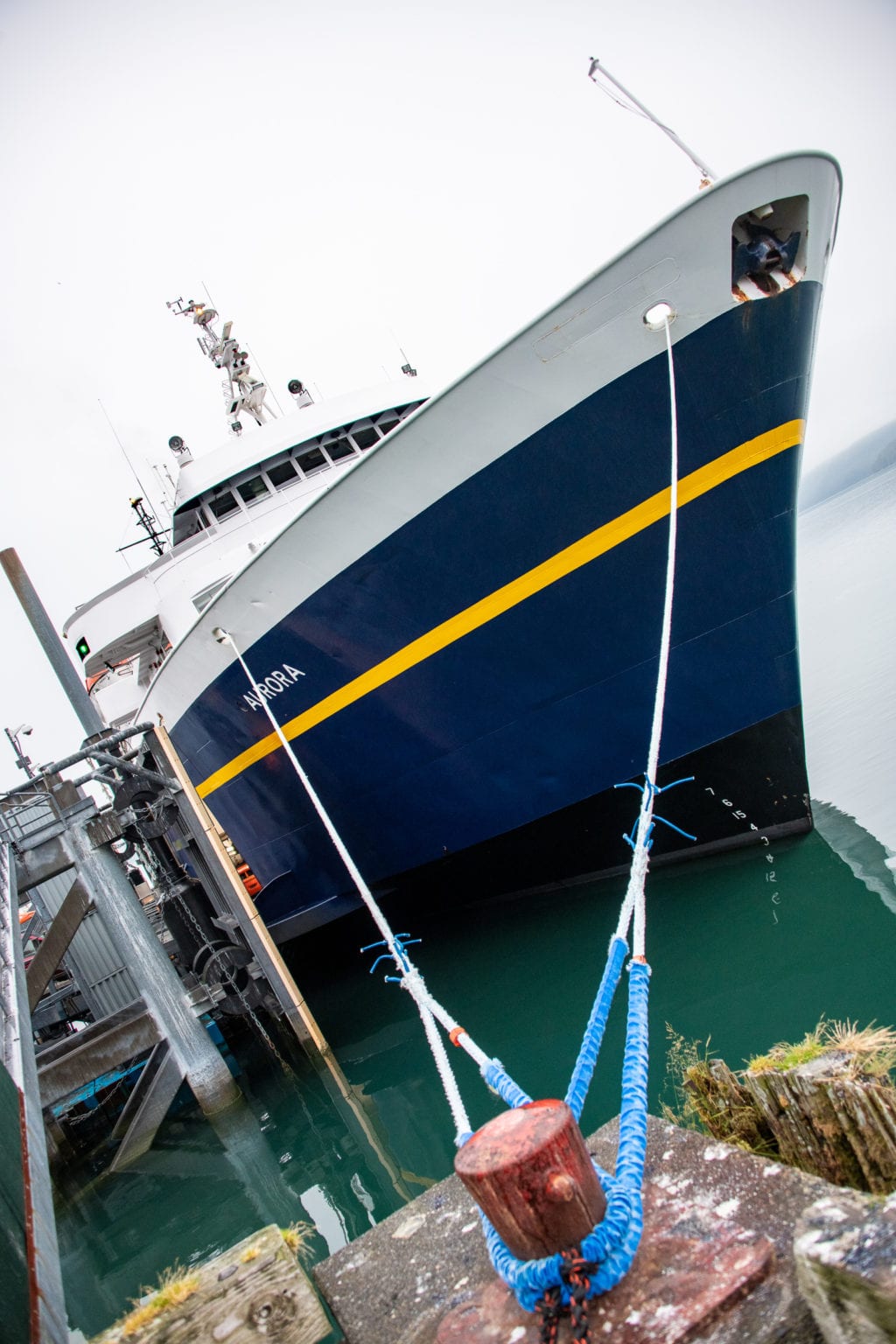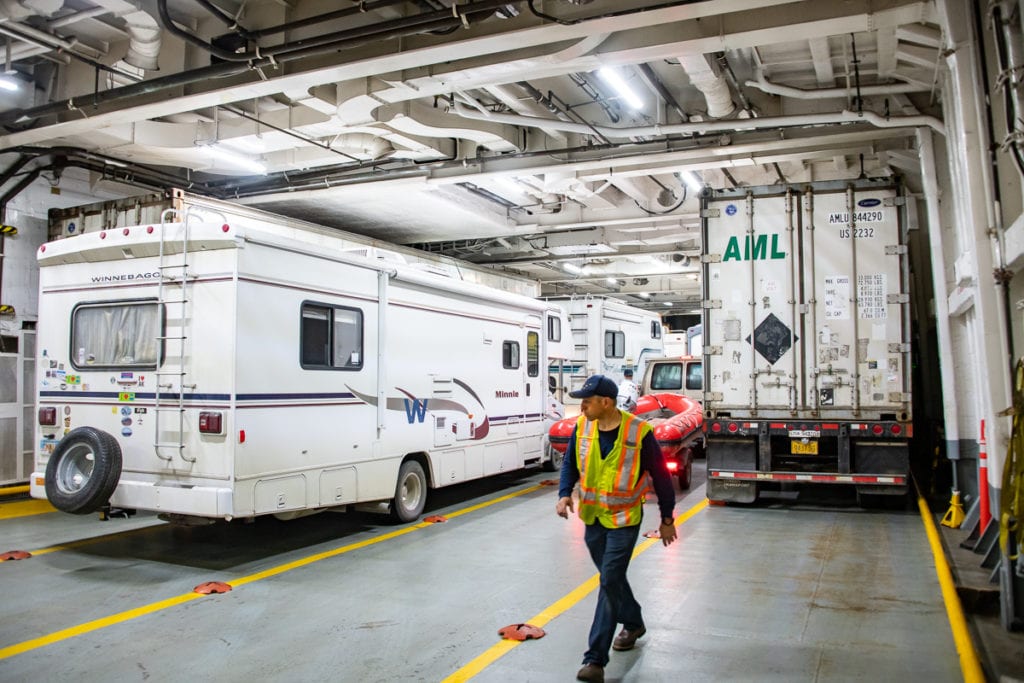
The Orca Adventure Lodge needs toilet paper. Normally, owner Wendy Ranney would send her box truck to bring back rolls from Anchorage. However, the ferry service that would have carried Ranney’s truck has provisionally been cancelled from Oct.1 through April 30, 2020. Ranney lacks both the staff and the storage space to stockpile enough toilet paper to last out the proposed seven-month ferry stoppage.
And once Ranney works out where to source the lodge’s toilet paper, there’s the issue of laundry soap. The issue of paper towels. The issue of the life raft in need of its yearly maintenance trip, but too large to be carried by Alaska Airlines. Like many Cordova businesses, the Orca Adventure Lodge is now caught in a tangle of small and large problems introduced by a proposed sudden gap in ferry service. Alone, any one of these problems would be an inconvenience. Together, they threaten to throw Ranney’s business into disequilibrium.
“We’ve built our business model up around the ferry service,” Ranney said. “To throw us a curveball like this, where you cut everything all of a sudden, is difficult to manage.”
Like many other Alaska communities lacking an outbound surface road, Cordova relies on the Alaska Marine Highway System as its primary connection with the outside world. Businesses like the Orca Adventure Lodge use the AMHS ferry to deliver staples such as food and fuel, as well as the equipment used by the skiing, fishing and sailing enthusiasts who visit the town each winter.
When district schools ferry students to academic conferences and sports tournaments in Anchorage, it costs as little as one-fifth as much as going by air, said Alex Russin, superintendent of the Cordova School District.
Travel into Cordova would become as difficult as travel out, jeopardizing Cordova-based events like the regional wrestling tournament scheduled for December. The increased cost of importing perishable foods would raise grocery prices and reduce students’ access to fruits and vegetables in school lunches. The salad bar currently available to students five days per week could be cut to as little as one day per week if the ferry stoppage takes effect, Russin said.
“Just because it doesn’t seem real doesn’t mean it’s not really happening,” said Cathy Renfeldt, executive director of the Cordova Chamber of Commerce. “I don’t think it’s hit some people yet. When they go to the grocery store and pick up a gallon of milk for $12, it’ll hit them.”
The seven-month ferry stoppage is part of $44 million in cuts to the AMHS proposed in a capital budget draft for the fiscal year 2020. Although the AMHS initially indicated that it was willing to manipulate the budget to accommodate ferry service to Prince William Sound, this was later retracted, Cordova Mayor Clay Koplin said at a July 18 city council meeting.
“It’s absolutely not going to work for us to not have any ferry service,” Koplin said.

Rather than regarding the marine highway as a special service dependent on subsidization, legislators should look at it as an actual highway, Renfeldt said. Getting rid of ferry service to Prince William Sound would make as little sense as ripping up the highway system to save money on keeping it paved and patrolled, she said.
Research supports Renfeldt’s claim that the AMHS offers an indirect return on investment. A $117 million allotment to the AMHS returned $273 million in assorted economic benefits for Alaska, according to a 2016 study by the McDowell Group. The study found that, in 2014, the AMHS carried 3,862 container vans — shipping that otherwise would have been done by barge, by air or not at all. Ending the ferry service that has facilitated this growth would ultimately cost more than it saves, Renfeldt said.
“A gap in service like this is unprecedented,” Renfeldt said. “I see it as a decision that is targeted … specifically at Prince William Sound. I see Prince William Sound as the only grouping of communities, the only area, that was cut to this extent on the draft schedule put out by the Department of Transportation. It would be a death blow to many communities in Prince William Sound.”
The Alaska House Transportation Committee has scheduled a meeting for Saturday, July 27, at the Cordova Center, to hear testimony from residents on the proposed schedule changes. A second meeting is planned for Monday, July 29, in which residents will be able to comment on the schedule changes in a teleconference with the Alaska Department of Transportation. A room in the Cordova Center has been reserved for the teleconference.
Make your voice heard
Residents are invited to comment on the proposed seven-month ferry stoppage by the following methods:
- Attend a meeting of the House Transportation Committee at 1:30 p.m. on Saturday, July 27 at the Cordova Center.
- Attend a teleconference with the Department of Transportation at 1:30 p.m. on Monday, July 29 at the Cordova Center. Doors will open at 1 p.m. at Community Rooms A and B. Residents can participate in the teleconference remotely by calling (515) 604-9000, access code 279613.
- Email dot.amhs.comments@alaska.gov. Deadline: Friday, July 26.





